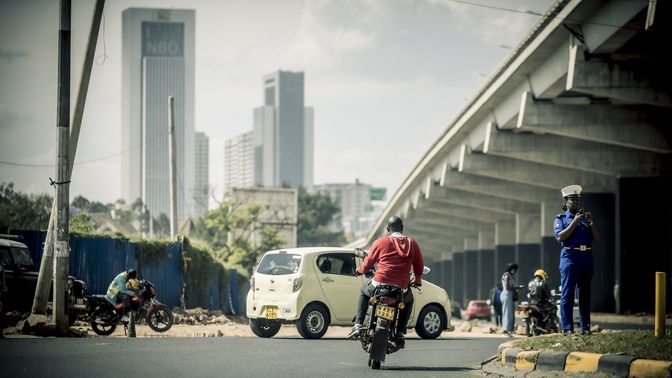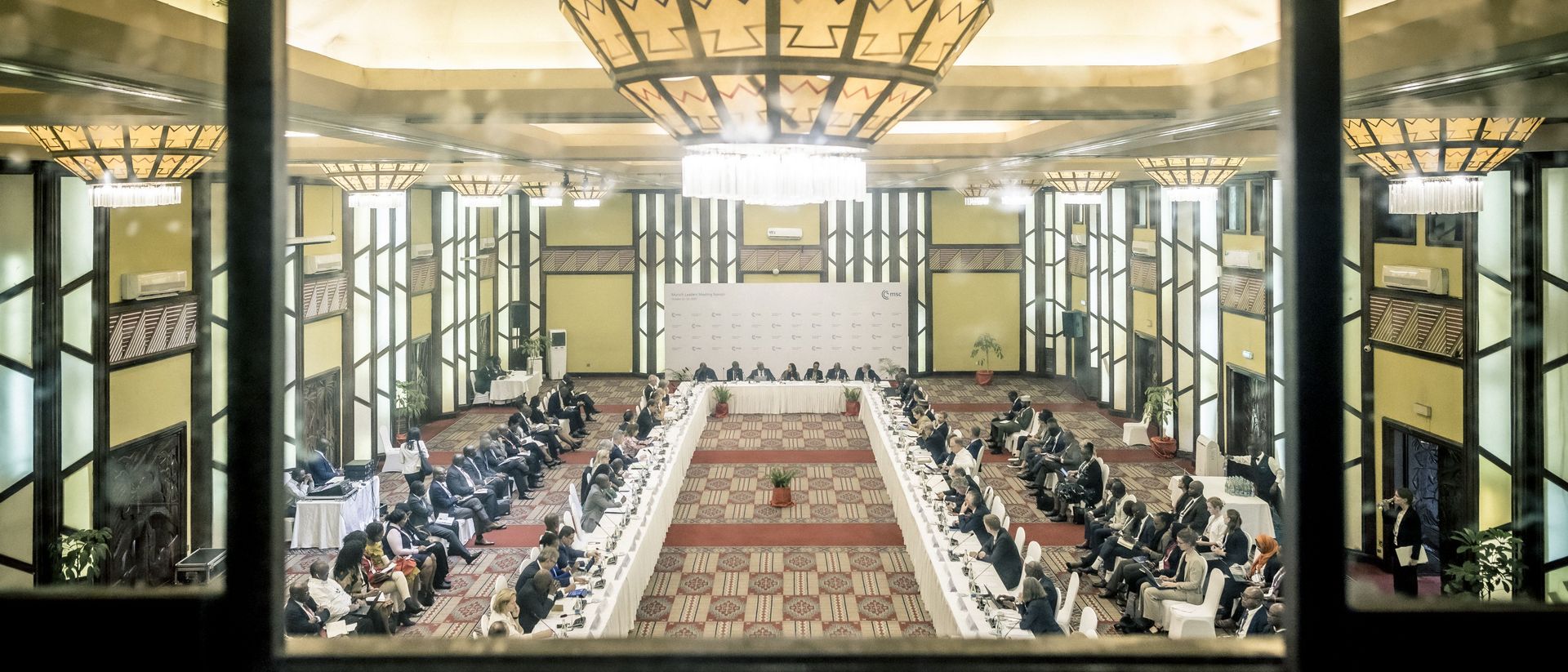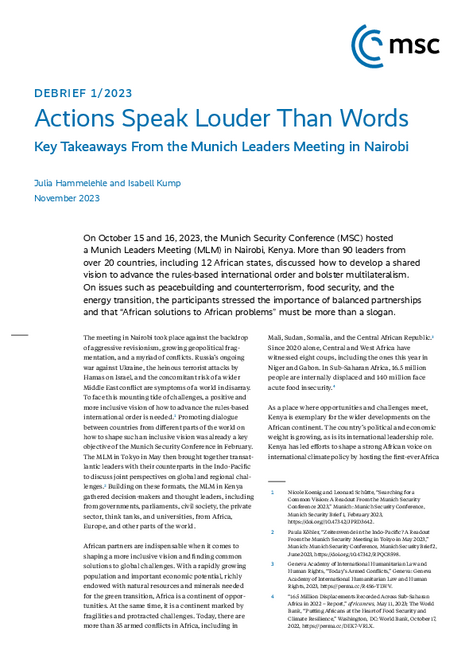

Actions Speak Louder Than Words
Key Takeaways From the Munich Leaders Meeting in Nairobi
 AuthorJulia Hammelehle
AuthorJulia Hammelehle AuthorIsabell Kump
AuthorIsabell Kump
 AuthorJulia Hammelehle
AuthorJulia Hammelehle AuthorIsabell Kump
AuthorIsabell Kump
Key Points
Comprehensive reforms of international institutions are needed to strengthen the African voice in global governance. African agency requires speaking with a common voice.
European countries need to offer a better and fairer deal to African countries to shape mutually beneficial partnerships. African partners are weighing their options.
All sides need to deliver on their commitments – be it with regard to financial pledges or promises of good governance and the rule of law. African and European countries need to engage in a frank discussion on double standards.
Finally, partnerships will be measured by actions, not words. Concrete agendas on shared challenges are needed, including on food, climate, and energy security, as well as peacebuilding and counterterrorism.
The meeting in Nairobi took place against the backdrop of aggressive revisionism, growing geopolitical fragmentation, and a myriad of conflicts. Russia’s ongoing war against Ukraine, the heinous terrorist attacks by Hamas on Israel, and the concomitant risk of a wider Middle East conflict are symptoms of a world in disarray. To face this mounting tide of challenges, a positive and more inclusive vision of how to advance the rules-based international order is needed.[1] Promoting dialogue between countries from different parts of the world on how to shape such an inclusive vision was already a key objective of the Munich Security Conference in February. The MLM in Tokyo in May then brought together transatlantic leaders with their counterparts in the Indo-Pacific to discuss joint perspectives on global and regional challenges.[2] Building on these formats, the MLM in Kenya gathered decision-makers and thought leaders, including from governments, parliaments, civil society, the private sector, think tanks, and universities, from Africa, Europe, and other parts of the world.
African partners are indispensable when it comes to shaping a more inclusive vision and finding common solutions to global challenges. With a rapidly growing population and important economic potential, richly endowed with natural resources and minerals needed for the green transition, Africa is a continent of opportunities. At the same time, it is a continent marked by fragilities and protracted challenges. Today, there are more than 35 armed conflicts in Africa, including in Mali, Sudan, Somalia, and the Central African Republic.[3] Since 2020 alone, Central and West Africa have witnessed eight coups, including the ones this year in Niger and Gabon. In Sub-Saharan Africa, 16.5 million people are internally displaced and 140 million face acute food insecurity.[4]
As a place where opportunities and challenges meet, Kenya is exemplary for the wider developments on the African continent. The country’s political and economic weight is growing, as is its international leadership role. Kenya has led efforts to shape a strong African voice on international climate policy by hosting the first-ever Africa Climate Summit in Nairobi in September. Besides, it is playing a leading role in regional and international peacebuilding efforts, for example in Haiti.[5] Kenya is, however, also located in a region where multiple challenges overlap, including devastating droughts, food insecurity, rising commodity prices, protracted and re-emerging conflicts, and democratic backsliding.
Nairobi thus served as an ideal place to discuss joint approaches to opportunities and challenges. The meeting also offered a platform for addressing contentious issues including African countries’ allegations of Western double standards and the criticism originating primarily from Europe and the United States regarding the voting behavior of certain African nations on UN resolutions condemning Russia’s war against Ukraine. Four key dimensions emerged as building blocks of deeper, lasting transcontinental relationships.
Ensuring a Stronger African Voice
For a more equitable international system that delivers on the needs of African countries, better representation is crucial. To reflect Africa’s growing political and economic weight, global governance reforms including of the UN Security Council and international financial institutions are long overdue. While recent steps by the International Monetary Fund (IMF) and the World Bank, including adding a third seat for Sub-Saharan Africa in their respective boards, point in the right direction, they are far from sufficient. Regarding the Security Council, UN member states are still far away from reaching a compromise that could, for example, consist in the introduction of semi-permanent seats, allowing members to serve for more than two years and be regularly re-elected. Given their strong position in these organizations, Europe and the US need to support these reform initiatives. However, as one speaker put it, “agency cannot be granted, it must be taken.” In this sense, African participants recognized their responsibility to forge a common position and jointly push for reforms, not allowing one permanent member of the Security Council to hold Africa back from driving progress, for example by moving forward to text-based negotiations.
While a strong pan-African voice would be crucial for stronger agency and leadership, the discussion highlighted the difficulty of translating the diverse national positions into a shared agenda, also undermining the effectiveness of regional organizations such as the African Union (AU) or the Economic Community of West African States (ECOWAS). Many therefore stressed that a common voice must be built from the bottom-up, including sub-regional cooperation formats and civil society.
Forging Mutually Beneficial Partnerships
Building on the ample opportunities for deeper economic cooperation, such as in the field of renewable energy, European countries need to take concrete steps toward establishing mutually beneficial partnerships and prove that this notion is more than diplomatic window dressing. They have to speak with rather than about Africa and embrace mutual learning. “It should be about lessons learned and lessons shared from both sides,” to quote one speaker. Europeans have to acknowledge that there are areas where they need African countries as much as vice versa, and that the latter are increasingly considering alternative partners. Rather than pressuring African countries into choosing sides, European countries should strive to become the partners of choice. This requires better offers, moving away from what one participant portrayed as “predatory, self-enriching, and patronizing models of cooperation.” “Better offers” must include embracing high environmental, social, and governance standards. While other offers, such as China’s provision of inexpensive credit, allegedly devoid of conditions, may appear more attractive in the short run, they are increasingly facing criticism due to mounting debt, economic and political dependencies, labor exploitation, and environmental concerns.[6] It is policies that promote universal values, sustainability, and prosperity for the broader population that will finally win the day.
Delivering on International Commitments and Shared Values
Delivering on international commitments is crucial for establishing stable relationships based on mutual trust. For high-income countries this includes meeting the 100-billion-dollar climate finance pledge and making a credible proposal for the implementation of the Loss and Damage Fund adopted at COP27. Moreover, they need to step up efforts to foster the Sustainable Development Goals (SDGs) and work towards solutions to the mounting debt crisis, which is strangling 21 countries in Sub-Saharan Africa alone.[7] While the recent decisions by the World Bank and the IMF to expand concessional resources ease some of the burden, agreements on debt restructuring and relief between the different creditors are urgently needed.
Safeguarding good governance principles, civil liberties, political rights, and international law and implementing them in a consistent fashion must be the basis for a joint agenda. The discussions reflected on the “epidemic”[8] of coups in West Africa as well as broader authoritarian trends and good governance deficits in African countries, but also highlighted dangerous developments of democratic backsliding and rule of law violations in Europe. Several African participants criticized Western double standards. Reactions to the war in Ukraine and, most recently, to the escalation of violence in the Middle East have, in the eyes of many African representatives, shown that Europe and the US continue to treat “their” problems very differently from “Africa’s” and apply principles of international law as they see fit. Accusations of Western hypocrisy by African participants also arose from the inconsistent behavior of countries such as France in responding to coups in Niger and Chad. On the one hand, in 2021, France quickly declared its support for Idriss Déby Itno after he seized power following the death of his father, the former president of Chad.[9] On the other hand, after the military overthrew President Mohamed Bazoum in Niger in July 2023, France fully supported the decision of ECOWAS to overturn the military coup with a military intervention.[10]
Translating Words Into Action
Partnerships will be measured by actions, not words. The Covid-19 pandemic, climate change, or the ripple effects of Russia’s war against Ukraine illustrate the interlinked nature of global challenges. Joint international answers will be needed to address them. At the MLM, the discussions zoomed in on four policy issues.
First, African and European countries need to draw and exchange lessons on past peacebuilding and counterterrorism efforts. The discussions highlighted the importance of weak statehood and fragility as root causes of terrorism and obstacles to effective peacebuilding. In many places, terrorist organizations, such as Al Shabab, fill the vacuum that diminished state capacities leave, providing services such as revenue systems, security, or healthcare. The longer these actors fill the vacuum left by the state, the more difficult it will be to counter them – and to win back public support for state institutions. It is paramount to prevent “states within states,” as one participant put it, and to address root causes by forging strong institutions while actively engaging communities, treating them as partners in countering terrorism and building peace, not enemies. In contrast, through the indiscriminate targeting of civilians in Mali, the presence of the Russian Wagner Group demonstrates how violence against civilians can contribute to an environment conducive to the spread of terrorism. Since the Wagner Group began working with the Malian authorities – coinciding with the withdrawal of the French Operation Barkhane – terrorist attacks have been increasing and the size of ungoverned territory has been expanding.[11]
Second, the participants discussed the importance of breaking the vicious circle of food insecurity and conflict, and enhancing food resilience. Currently major food importers, African countries are highly vulnerable to the weaponization of food and other supply risks. The starting point of the debate was thus how Africa can use its potential to feed itself, including by diversifying food systems, rediscovering indigenous crops, scaling climate-resilient seeds, and fostering intra-African trade. Yet, to unlock this potential, massive investments in infrastructure and in research and development, as well as better access to technology and knowledge are needed. To achieve that, national and international actors will have to join forces, aligning policies of the public and private sector, international institutions, and local communities. Joint efforts are also crucial to address the mounting debt crisis that confronts countries with the decision “to buy food or service your debt.”
Third, the importance of mobilizing finance was central to the debate on climate and energy security. Heavily affected by climate change, climate adaptation finance to Africa must increase five- to tenfold by 2035 according to a recent report by the Climate Policy Initiative and the Global Center on Adaptation.[12] Investments, complemented by technology and knowledge transfers, must also multiply to untap the rich green energy and critical minerals potential of African countries. As more than half of the population in Sub-Saharan Africa still lives without access to electricity,[13] participants stressed that improving energy access for the local population must be the “first priority” of energy partnerships. Since the mining of critical minerals accounts only for a minor share in the value chain, fair raw materials partnerships must be designed to promote domestic refining and processing, focusing on value addition over extraction.
Fourth, fair partnerships are also crucial in the area of migration. Africa is frequently described as a “continent on the move,”[14] with high levels of labor migration, significant numbers of refugees, and the largest number of internally displaced people in the world. High-income countries are increasingly eager to open legal pathways to address shortages in skilled labor. Fair migration partnerships must include measures to mitigate the detrimental impact of brain drain from African countries. This includes offering programs for technical vocational training to support the economic development of the respective African countries.
Conclusion
The discussions in Nairobi underscored the importance of dialogue between leaders from Africa, Europe, and other parts of the world and the benefits of mutual learning. The discussions highlighted a number of principles that should guide this dialogue in the future. These include speaking with and not about Africa, and promoting a truly mutual exchange of lessons. It was, however, abundantly clear that dialogue alone will not suffice. The promise of mutually beneficial partnerships will be measured by actions, not words. For lasting transcontinental partnerships, based on mutual trust and solidarity, governments will need to drive an agenda for change: increasing the representation of African countries in the international system, forging mutually beneficial partnerships, and delivering on international commitments. This agenda for change will have to be translated into concrete actions in various policy dimensions, including, but going way beyond the areas addressed at this meeting. A consistent enactment of common values, anchored in international law
and the UN Charter, must be the foundation of these partnerships.

Actions Speak Louder Than Words – Debrief
Please cite as: Julia Hammelehle and Isabell Kump, “Actions Speak Louder Than Words: Key Takeaways From the Munich Leaders Meeting in Nairobi,” Munich: Munich Security Conference, Debrief 1, November 2023, https://doi.org/10.47342/JEHZ9824.
Download PDF 113 KB- [1] Nicole Koenig and Leonard Schütte, “Searching for a Common Vision: A Readout From the Munich Security Conference 2023,” Munich: Munich Security Conference, Munich Security Brief 1, February 2023, doi.org//10.47342/JPRD3642.
- [2] Paula Köhler, “Zeitenwende in the Indo-Pacific? A Readout From the Munich Security Meeting in Tokyo in May 2023,” Munich: Munich Security Conference, Munich Security Brief 2, June 2023, doi.org/10.47342/RPQC8598.
- [3] Geneva Academy of International Humanitarian Law and Human Rights, “Today’s Armed Conflicts,” Geneva: Geneva Academy of International Humanitarian Law and Human Rights, 2023, perma.cc/R4S6-TLWV.
- [4] “16.5 Million Displacements Recorded Across Sub-Saharan Africa in 2022 – Report,” africanews, May 11, 2023; The World Bank, “Putting Africans at the Heart of Food Security and Climate Resilience,” Washington, DC: World Bank, October 17, 2022, perma.cc/DEK7-VRLX.
- [5] Alan Yuhas, “Kenyan-Led Security Mission in Haiti: What to Know,” The New York Times, October 2, 2023.
- [6] Nadia Clark, “The Rise and Fall of the BRI,” New York City: Council on Foreign Relations, Asia Unbound, April 6, 2023, perma.cc/4E64-MTNF.
- [7] “Kenya Wants to Pioneer a New African Approach to Global Warming,” The Economist, September 14, 2023.
- [8] Ishaan Tharoor, “Amid a Wave of West African Coups, France Faces a Reckoning,” The Washington Post, September 1, 2023.
- [9] “A Year After Chad Coup, Junta’s Promises Start to Fade,” Euractiv, April 18, 2022.
- [10] “France Supports ECOWAS Intervention in Niger, Foreign Minister Says,” France24, August 5, 2023.
- [11] Colin P. Clarke and Michael Shurkin, “The United States Should Work With the Sahel’s New Juntas,” World Politics Review, August 28, 2023.
- [12] “Accelerating Adaptation Finance: Africa and Global Perspectives,” Rotterdam/San Francisco: Global Center on Adaptation and Climate Policy Initiative, September 2023, perma.cc/A5AD-72L7.
- [13] United Nations Conference on Trade and Development, “Commodities at a Glance: Special Issue on Access to Energy in Sub-Saharan Africa,” Geneva: United Nations Conference on Trade and Development, United Nations Publications 17, 2023, perma.cc/GF7R-YZYV, 2.
- [14] African Union, “‘Africa is on the Move.’ Full Statement by the Deputy Chairperson on the 55th Commemoration of Africa Day in Ankara, Turkey,” Addis Ababa: African Union, May 25, 2018, perma.cc/7CF7-4VPV.